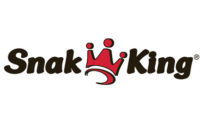
Snak King bounced back to business after a roof collapse and a factory fire only to learn that some disasters don’t always end up that tragic.
By Marina Mayer
Once upon a time in the City of Industry, Calif., Barry Levin took over the reins of a struggling snack company. Within a year of starting with Snak King in 1978, Levin turned a company with anemic sales and a $100,000 loss into a modestly profitable enterprise. Impressed by this turn of events, the company’s three owners, all passive investors, invited him to buy one-third of Snak King’s stock. Over the next five years, he purchased the rest of the business.
Almost 30 years later, Levin is the chairman and CEO of the West Coast snack manufacturer, known for its wide variety of products, including tortilla chips, pork rinds, cheese puffs, cheese curls, popcorn, nuts and trail mixes.
But his stroll over the castle’s red carpeted bridge didn’t always appear to be heading for a storybook happy ending.
For starters, in October 2004, torrential rainfall triggered a massive roof collapse that disrupted operations so much that the future of the company was in doubt. Adding insult to injury, a couple of months later, a small fire broke out from a tortilla chip fryer, making the rebuilding process even more challenging.
Life in the snack industry became anything but a fairy tale.
Instead of throwing up their hands and walking away from this regal mess, the management team at Snak King resolved to rebuild their operation.
In fact, Levin says shutting down the operation or relocating it wasn’t an option. Despite the two tragedies, Snak King had to come back.
It took the company three years and more than $30 million to fully rebuild the plant and retool the operations to its current condition. Certainly, there were times when it seemed that the job would never get done.
Almost immediately after the roof collapse, Snak King’s management team jumped into action to get the plant up and running. While employees waded through water to gather debris and remove chunks of the roof, Ron Jones, Snak King’s president and chief operating officer, directed operations to clean up the usable equipment and put it into a configuration that would allow it to crank out products.
Meanwhile, Joe Papiri, vice president of sales and marketing, accepted the aid of competing snack producers who offered to outsource or co-pack snack products. As a result, the company was able to provide a steady supply to customers and maintain position in the market.
During the rebuilding effort, Snak King hired Mark Schieldge as vice president of operations to oversee the major improvements of the plant.
Despite the benefits associated with installing new equipment, Schieldge says they still needed to do a lot of training and development of employees.
Plus, the overall layout of the operation needed to change because the new equipment offered greater versatility to produce a wider variety of products.
“We were very creative in how we set up the production lines, to streamline and give the rebuilt plant greater flexibility,” Schieldge notes. “And we were still able to increase our overall output.”
The plant now includes state-of-the-art, automated production lines that provides not only increased capacity, but also enhanced product quality with greater consistency. With the greater output of production, Snak King’s sales team expanded to seek out new growth opportunities, Papiri notes.
And so what started out as the operation’s well-planned response to a disaster enabled it to come back in better shape than ever before.
Crowning Achievements
While resolving internal issues and adapting to what had become an ever-changing operation, the management team also had to stay abreast of shifting consumer and retail trends in the snack industry.
Snak King is no stranger to being on the cutting edge of what consumers want. Its family of brands - El Sabroso, Jensen’s Orchard and Granny Goose - has done anything but falter in the wake of tragedy.
The El Sabroso line, consisting of pork rinds, tortilla chips, cheese snacks and nuts with a traditional, full-flavor, Mexican-inspired taste, continues to expand. It is best known for its innovative seasoned tortilla chips, such as Guacachips with the real flavor and ingredients of guacamole right in the chip, Salsitas with real salsa cooked into the tortilla chip and Jalapeñitos with real jalapeños for a real nacho cheese experience.
The Jensen’s Orchard brand provides innovative and natural snacks such as Veggie Chips, Bruschetta Chips and Spinach and Artichoke Chips, to consumers looking for new snacks that meet their changing demands.
Additionally, the Granny Goose line is made up of value-positioned snacks and is owned and marketed by Snak King.
At the end of the day, Jones says, Snak King products have to cater to consumer tastes that have become more sophisticated over the years. Shoppers are more demanding than they used to be about the ingredients that go into products, and snack foods still need to taste good.
Additionally, Levin says, changing demographics such as the growth of the Latino population are driving Snak King’s sales. These consumers place a greater focus on healthier and more natural snacks.
Moreover, the consumers’ continual quest for new and interesting snacks and flavors has been fueling the company’s business, Levin says.
Despite keeping up with what’s hot and what’s not, Papiri acknowledges that the company is selective about what trends it wants to pursue.
Overall, the health and wellness trend is one that the
company keeps an eye on, Papiri says.
Whether it’s organic, natural, whole grain or lower fat, these are the niches the company does well in. It’s a growing area and customers are more concerned about what they eat.
Consumers also are paying attention to the business’ status in the community. For instance, the state of California continues to increase government regulations so that production facilities function according to eco-friendly rules. Snak King is evaluating such changes by using sustainable or compostable bags and recycling all shipping and storage boxes after use, Papiri explains.
The company, Papiri adds, has made innovations in the packaging area by introducing products in a matte finish bag as opposed to the typical shiny snack packaging. It’s also using stand-up bags for improved merchandising and with zippers for consumer convenience in larger sizes.
Packaging design in general, Jones says, needs to evolve constantly so that product representation on the shelf stays fresh with consumers as they respond to and are searching for something new and exciting.
In addition to upgrading its products, the company also managed to chalk up more accolades even while weathering the storm and putting out fires.
In 2006, Snak King received the “Excellence in Business-Manufacturing” reward from Los Angeles Business Journal and Snack Food & Wholesale Bakery magazine crowned the company with its annual “Snack Manufacturer of the Year” award. Levin, a former chairman of the Snack Food Association, was honored by Ernst & Young as “2007 Entrepreneur of the Year” for the greater Los Angeles.
But it’s not just the honors that hold a gratifying place in his heart.
“It’s an honor to receive the awards we’ve received, but really the acknowledgement is for everybody in the company,” Levin says. “The greatest reward is working with people who enjoy what they do every day.”
Ensuring Success
Looking back at the spate of unfortunate instances, Levin, Jones, Papiri and Schieldge are quick to note that having sufficient insurance coverage helped save the company from literally collapsing under the weight of its own roof.
“Mind you, you want insurance,” Levin says. “It’s really not for the minor daily fender benders shall we say. It’s really for the catastrophic challenge, the [one] that’s so big that you can’t afford to overcome it without insurance.”
Jones advises all snack producers to have an emergency plan in place and to continually review insurance policies on a regular basis.
Despite the chain of unfortunate events, Jones says, the company is better off now than anytime within the last 10 years.
The company, Papiri adds, will continue to flourish despite government regulations, a changing retail environment and increased competition in the salted snack market.
“[In five years], I think we’ll still be having fun,” he predicts. “We know what challenges are ahead.”
In the meantime, the ability to weather the bad times and the determination to come back stronger has provided additional payoffs.
“You surround yourself with good people that have positive attitudes in life,” Jones says, “and it becomes contagious.”
That approach combined with a knack for innovation helps companies like Snak King overcome any obstacles, Levin says.
“You come up with an idea, you design a product, you design a package, you put it on the shelf,” he notes. “So the great thing about this industry is that you have the ability to be creative. How much better can life be?”
Together, they hope to produce snacks happily ever after.


